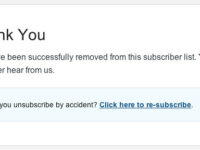The Federal Court of Appeal’s ruling on Canada’s anti-spam law puts to rest persistent claims that the law is unconstitutional. As discussed at length in my earlier post, the court firmly rejected the constitutional arguments in finding that the law addresses a real problem and has proven beneficial. The impact of the decision extends beyond just affirming that CASL is (subject to a potential appeal to the Supreme Court of Canada) here to stay. It also provides important guidance on how to interpret the law with analysis of the business-to-business exception, implied consent, and what constitutes a valid unsubscribe mechanism.
Archive for June 11th, 2020

Law Bytes
Episode 231: Sara Bannerman on How Canadian Political Parties Maximize Voter Data Collection and Minimize Privacy Safeguards
byMichael Geist
March 31, 2025
Michael Geist
March 24, 2025
Michael Geist
March 10, 2025
Michael Geist
Search Results placeholder
Recent Posts
 The Law Bytes Podcast, Episode 231: Sara Bannerman on How Canadian Political Parties Maximize Voter Data Collection and Minimize Privacy Safeguards
The Law Bytes Podcast, Episode 231: Sara Bannerman on How Canadian Political Parties Maximize Voter Data Collection and Minimize Privacy Safeguards  The Law Bytes Podcast, Episode 230: Aengus Bridgman on the 2025 Federal Election, Social Media Platforms, and Misinformation
The Law Bytes Podcast, Episode 230: Aengus Bridgman on the 2025 Federal Election, Social Media Platforms, and Misinformation  The Law Bytes Podcast, Episode 229: My Digital Access Day Keynote – Assessing the Canadian Digital Policy Record
The Law Bytes Podcast, Episode 229: My Digital Access Day Keynote – Assessing the Canadian Digital Policy Record  Queen’s University Trustees Reject Divestment Efforts Emphasizing the Importance of Institutional Neutrality
Queen’s University Trustees Reject Divestment Efforts Emphasizing the Importance of Institutional Neutrality  The Law Bytes Podcast, Episode 228: Kumanan Wilson on Why Canadian Health Data Requires Stronger Privacy Protection in the Trump Era
The Law Bytes Podcast, Episode 228: Kumanan Wilson on Why Canadian Health Data Requires Stronger Privacy Protection in the Trump Era

